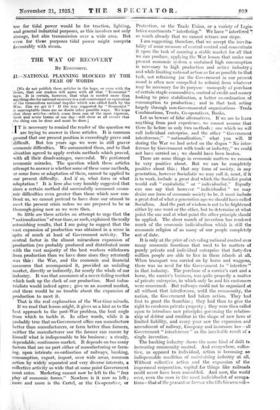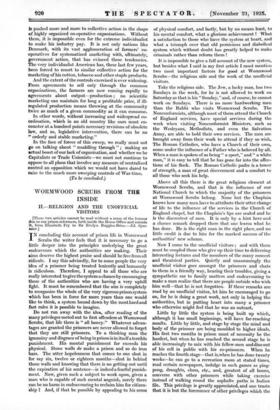THE -WAY OF RECOVERY By ECONOMIST.
PLANNING BLOCKED BY THE FEAR OF WORDS • [1%.*43 do not publish these articles in the hope, or even with the desire, that our readers will agree with all that " Economist " 'Says.. It is certain, however, that what is needed more than anything else for national recovery is a real counterpart or equivalent Of the tremendous national impulse which was called forth by the Mar. Can we get it ? If. the way suggested by " Economist " is unacceptable there are no doubt other possible ways. We hope that these articles—which come from one of the most vigorous, fresh and acute brains of our day—will show at all events that the thing can be done and must be done.] 'T T is necessary to remind the reader of the question we are trying to answer in these articles. It is common _ground that our present position is exceedingly grave and difficult. But ten years ago we were in still graver economic difficulties. We surmounted them, and to that Situation agreed to apply certain methods which proved, with all their disadvantages, successful.. We performed economic miracles. The question which these articles :attempt to answer is whether some of these same methods, • or some form or adaptation of them, cannot be applied to our present difficulty. And if so, what form or what ,adaptation ? It is here also very humbly suggested that :since a certain method did successfully surmount econo- mic difficulties even greater than those which now con- ( front us, we cannot pretend to have done our utmost to meet the present crisis unless we are prepared to be as thorough-going now as we were then.
So little are these articles an attempt to urge that the "nationalization" of war-time, as such, explained the really • astonishing results, that I am going to suggest that the vast expansion of production was obtained in a 'sense in ;spite of much at least of Government activity. The central factor in the almost miraculous expansion of production (we probably produced and distributed more with the vast majority of the best workers withdrawn from production than we have done since they returned) was this : the War, and the economic and financial i measures that accompanied it, provided an unfailing .market, directly or indirectly, for nearly the whole of our .industry. It was that assurance of a never-failing market which took up the slack of our production. Most indus- trialists would indeed agree ; give us an assured market, and there would be no trouble about the expansion • of production to meet it.
That is the real explanation of the War-time miracle.
If we read that lesson aright:it:gives us .a hint as to the best approach to the post-War problem, the best angle from which to tackle it. In other words, while it is probably true that no Government office can mannfacture better than mknufacturers, or farm better than farmers, neither the manufatturer nor the farmer 'can ensure by himself what is indispensable to his business ; a steady, dependable; continuous market. It depends on too many factors that are no part either of manufacturing or farm!. ing, upon intricate co-ordination of railways, banking, • consumption, 'export, import, over wide areas, common action by widely separated and very diverstinterests, a collective activity so wide that at some point Government must enter. Marketing cannot now be 'left to the "free play of economic forces." Nowhere is it now so left ; more and more is the Cartel, or the Co-operative; or Protection, or the Trade Union, or a variety of Legis- lative enactments " interfering." We have " interfered so much already that we cannot retrace our steps. I am suggesting, therefore, that we accept the inevita- bility of some measure of •central control and concentrate it upon the task of assuring a stable 'market for all that we can produee, :appl■-ing the War lesSon tbit 'under out 'present economic system a: sustained high. consumption is necessary to high production and active industry ; and while limiting national action as far as possible to that task, not refraining (as the Government in our present mood is often now compelled to refrain) from whatever may be necessary for its purpose—monopoly of purchase of certain staple commodities, control of credit and money looking to price stabilization, a better co-ordination of consumption to production ; and in that task acting largely through non-Governthental organizations—Trade Combinations, Trusts, Co-operatives, Banks.
. Let us beware of false alternatives. If we arc to learn anything from past experience, we cannot assume that there lie before_ us only two Methods ; one Which we will call individual enterprise, and the other " Government interference," " nationalization," what you will. It during the War we had acted on the slogan " No inter- ference by Government with trade or industry," we could not have carried on ; we should have been beaten.
There are some things in economic matters we cannot be very positive about. But we can be completely positive about this ; that any form of society; in any generation, however Socialistic we may call it, must, if it is to work, include a great deal which the Socialist purist would call " capitalistic " or " individualist." Equally can one say that however " individualist " we may desire our form of economic society to be, it must include a great deal of what a generation ago we should have called Socialism. And the part of wisdom- is not to be frightened either by one word or the other, but to determine at what point the one and at what point the other principle should be applied. The sheer march of invention has rendered much of the economic individualism which is still the economic religion of so many of our people completely out of date.
It is only at the price of extending national control over many economic functions that used to be matters of purely private and individual enterprise that forty-five million people are able to live in these islands at all. When transport was carried on by horse and waggons, there was no need for the Government to " interfere " in that industry. The purchase of a carrier's cart and a horse, the carrier's business, was quite properly a matter of private enterprise, in which only lie and his customers were concerned. But railways could not be organized at all without that interference, until the community, the nation, the Government had taken action. They had first to grant the franchise ; they had then to give the right to condemn private property ; they were then called upon to introduce new principles governing the relation- ship of debtor and creditor in the shape of new laws of limited liability; and every year saw the expansion and amendment of railWay, Company and insurance lawall Government " interference " as the inevitable result of a single invention.
The banking industry shows the same kind of drift to increasing community control. And everywhere, collec- tive, as opposed to individual, action is becoming an indispensable condition of maintaining industry at ail. Without collective action and the expansion of the impersonal corporation, capital for things like railroads could never have been assembled. And now, the world over, even the man in the most individualist of occupap tions—that of the peasant or farmer who tills his own soil- is pushed more and more to collective action in the shape of highly organized co-operative organizations. Without them, it is impossible even for the extreme individualist to make his industry pay. It is not only nations like Denmark, with its vast agglomeration of farmers' co- operatives for systematized ;marketing with, ultimately, government action, that has evinced these tendencies. The very individualist American has, these last few years, been forced to resort to similar collective action for the marketing of his cotton, tobacco and other staple products.
And the extent of the controls exercised is ever widening. From agreements to sell only through the common organizations, the farmers are now coming rapidly to agreements about output—production ; no scientific marketing can maintain for long a profitable price, if ill- regulated production means throwing at the community twice as much of a given commodity as it can consume.
In other words, without increasing and widespread co- ordination, which in an old country like ours must en- counter at a hundred points necessary revisions of obsolete law, and so, legislative intervention, there can be no orderly and stable marketing."
In the face of forces of this sweep, we really must not go on talking about " muddling through " ; making an actual boast of our lack of organization, and whether we be Capitalists or Trade Unionists—we must not continue to oppose to all plans that involve any measure of centralized control an opposition which we would not have dared to raise to the much more sweeping controls of War-time, (To be concluded.)















































 Previous page
Previous page